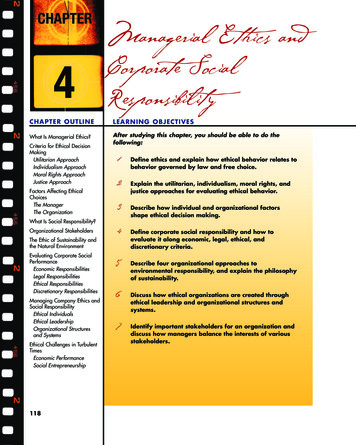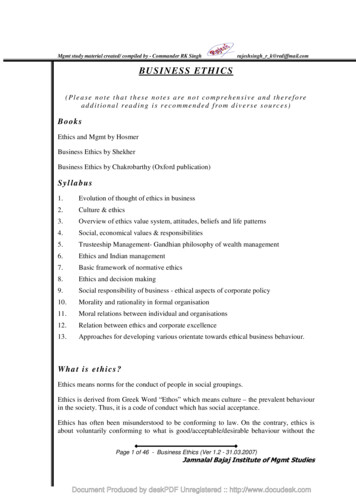
Transcription
Influencing Others: Role of Ethics,Persuasion, Manipulation &DeceptionAU Key Webinar WednesdaysJames M. EisenmannJune 3, 2020
What is the goal? Influence those around us (and be influenced) to producegoals of organization without force/authority/sanction in anethical manner Influence ethically to produce a goal without the use of force,authority or sanction
To be successful at this you need a few things . An ethical core/integrity A reputation for being ethical/integrity Recognize manipulation and deception Ability to persuade Sometimes called political savvy
You need to have integrity tosuccessfully influence othersSo what is integrity?Someone who consistently abides by their own ethical code and those ofthe particular organization or profession
Why do ethics matter when it comes toinfluence?If people do not view you as an ethical person, their ability to trust youis seriously diminished
Clash of CoreValues Truth vs. Loyalty Individual vs.Community Short Term vs. LongTerm Justice vs. MercyThis Photo by Unknown Author is licensed under CC BY-NC-ND
Ethical Person Leaders are associated with certaintraits, behaviors and decisions
Ethical Traits:Substantiveethical core Honest Caring Trustworthy Sincere Factual/AccurateBut Must be authentic
EthicalBehaviors Open/transparent Be communicative Clarity in communications Show concern Provide safe environment Act in accordance with ethicalprinciples
EthicalDecisions Objective Fair Broad perspective Clear, repeatable decision-makingprocess
Do you have areputation for Being ethical? Following through? Following rules? Delivering what you promise? Giving credit and taking blame?
How do youdevelop thisreputation?How dopeople know? Need to be a role model for followingethics rules Weigh in on ethics questions in meetings Be careful of jokes/sarcasm related toethics Share stories of ethics violations andconsequences
How can you help to create a culture ofethical behavior and decision making and areputation for such?EthicalManager Role modeling through visible action Communicating and sharing theimportance of ethics to you Reward/Discipline
Ok, so you’re an ethical leader and you havea reputation for being ethical, now what?Need to be able to detect those who wouldmanipulate and deceive you
Who is this?
Niccolò Machiavelli Born May 3, 1469. Died June 21, 1527, Florence, Italy Italian Renaissance political philosopher and statesman,secretary of the Florentine republic. Most famous work, The Prince (Il Principe) Earned reputation as an atheist and an immoral cynic. “Ends justify the means”
Detecting manipulators Seeks power not to help others but for power sake Seeks the promotion as a goal rather than the result of savvy, ethicalwork Takes credit Manipulates Creates losers Self-promotion Deflecting blame Whispers to higher-ups Boss/supervisor likes them more than peers or subordinates
Manipulator vs. SavvyManipulator Manipulates Creates losers Power for own sake Hidden agendas Takes credit Spreads/deflects blameSavvy Influences Creates winners Power to get things done Open/transparent agendas Spreads credit Accepts blame
Who are manipulators? Bosses Peers Subordinates
Ways to handle manipulators Do not confront head on Not important to prove they are manipulators Know their agendas & be creative about channeling theirdrive/energy/force into a result that is good for the organization “Shed light” – open the decision-making process Create opportunities for the manipulator to reveal themselves –grabbing credit
Deception
Leaders will be and are deceivedDeception works
Why are leaders the target of deception?They have all the power – how could they be deceived? Fear Of what? Being wrong Being seen as indecisive Legacy Losing money Being criticized Greed Not wanting to take on certain players
Why are leaders the target of deception? Stems from self-deception Susceptible to false flattery Out of touch with reality – too many “yes” people Pressure Temptation They trust too much in the good of others (U.S. Grant)
Handling deception Take action against those who deceive Shedding light/group meetings Innocent distortion of information vs. deliberate deception
Deception typically comes in form ofinformation so be critical Motives Track record/history – fair, precise, agenda-focused, shading thetruth; is she considered a mentor or coach by others Concerned about how she appears to others/the boss; take a holisticapproach, does she always side with the leader Depth of the information Is she really fully listening, or simply agreeing/disagreeingimmediately Communication style – direct, open, guarded, vague
Handling deception Ask for opinions before revealing your thoughts Don’t let the bad-mouthing continue Ask for examples. Captures liars and those with sloppylanguage. Shows that you are paying attention to (and critical of) whatthey are saying. Thank people publicly for pointing out mistakes you’vemade, or provide bad news or the “Devil’s advocate”
Ok, so we’re ethical, we have a reputation for beingethical, we know who the schemers and deceivers are,now what .
Before we persuade, we have tounderstand whether people arewilling to be persuaded
Persuasion Instinct for offering facts/figures supporting our view andcontradicting others Why doesn’t that always work? Once people have committed to a decision, difficult to persuade themto adopt a different one It is particularly difficult when people have firmly held beliefs We may then ignore evidence suggesting that we might be wrong Being confronted with evidence that seems to contradict strongly heldviews makes you feel uncomfortable, people will resolve that feelingby rationalizing away the conflicting information
Persuasion Information is evaluated relative to preestablished beliefs How to address this? Do not try to change a belief but instead try to install a new belief Do not try to prove others wrong – focus on common ground and commonmotivations
Persuasion Negotiating & learning process throughwhich a persuader leads individuals to aproblem’s shared solution. Not involve begging, forcing,threatening, etc. You want to get someone or some groupfrom point A to point B. How can you persuade them to do that?
PersuasionPhases Discovery Preparation Dialogue
Persuasion Before negotiating or trying to persuade,ask yourself: Do I have enough information to start? Am I willing to hear and understand theother side and other/differentinformation? Am I open minded?
4 steps to successful persuasion:Persuasion 1.2.3.4.CredibilityCommon groundEvidenceEmotional connection
2 aspects of credibilityPersuasion:Credibility Expertise/subject matter Prove self knowledgeable about the subject History of prior successes Relationships Over time demonstrated they can be trusted,honest, reliable Robust relationships Given benefit of doubt May have both, or only one
How to address area of weakness?PersuasionCredibility Expertise/subject matter Education – formal (classes) or informal(conversations with experts) Employ someone with expertisecredibility Use reputable outside sources – reports,studies, etc.
RelationshipsPersuasion Meet one on one with key individuals Involve colleagues who have strongrelationship credibility Difficult to address if your reputation orcredibility is in question
Persuasion Common ground/motivation Identifying shared benefits Need to have a solid understanding ofaudience Study the issues that have been importantto those trying to influence Learn from listening and informalnetworking with that person and otherswho know that person
Persuasion Evidence Facts that demonstrate your idea works oris in best interests of organization Provide the evidence in an easilydigestible format Easily repeatable format Stories work well at times Make sure your facts add up - literally
Emotional connectionPersuasion Know where your audience isemotionally on an issue What is the mood, pulse of youraudience?
Persuasion 4 common pitfalls to persuasion: Attempt to make case with up front hardsell Resist compromise Assume secret of persuasion lies inpresenting great arguments Assume persuasion is a one-shot effort
Thank you!James M. denlg.com
Jun 3, 2020











